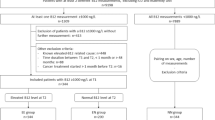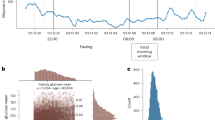Abstract
Objective: To investigate the effect of sodium, protein and calcium in habitual diets on bone resorption.
Design: A cross-sectional study.
Setting: A community-based study.
Subjects: Healthy free-living male (n=342) and female (n=421) volunteers aged 20–79 y recruited for a health and nutrition examination survey conducted by a local government.
Methods: Bone resorption was assessed by the measurement of free deoxypyridinoline in 24 h urine. Dietary assessment was by one-day dietary record method. Sodium and urea in 24 h urine were also measured for assessment of sodium and protein intake. The relationships between deoxypyridinoline excretion and the dietary factors were examined using correlation and multiple regression statistics.
Results: In women aged 50–79 y, protein intake was positively associated with deoxypyridinoline excretion (P<0.05); and the urinary deoxypyridinoline/creatinine ratio was positively associated with both the urinary calcium/creatinine ratio (P<0.01) and sodium/creatinine ratio (P<0.05). In the multiple regression model, the association of the deoxypyridinoline/creatinine ratio and sodium/creatinine ratio was still significant (P<0.05) after adjustment for possible confounders, in this sex and age group.
Conclusion: In elderly women, habitual excess sodium in diets may result in bone loss through accelerated bone resorption.
Sponsorship: Grant from the Ministry of Health and Welfare, Japan.
This is a preview of subscription content, access via your institution
Access options
Subscribe to this journal
Receive 12 print issues and online access
$259.00 per year
only $21.58 per issue
Buy this article
- Purchase on Springer Link
- Instant access to full article PDF
Prices may be subject to local taxes which are calculated during checkout
Similar content being viewed by others
Author information
Authors and Affiliations
Contributions
Guarantor: R Itoh.
Contributors: R Itoh contributed to the grant application and to the implementation of the fieldwork. Y Suyama organised the data management. Y Oguma and F Yokota did the chemical analyses. All investigators contributed to the discussion of the results and the writing of the paper.
Rights and permissions
About this article
Cite this article
Itoh, R., Suyama, Y., Oguma, Y. et al. Dietary sodium, an independent determinant for urinary deoxypyridinoline in elderly women. A cross-sectional study on the effect of dietary factors on deoxypyridinoline excretion in 24-h urine specimens from 763 free-living healthy Japanese. Eur J Clin Nutr 53, 886–890 (1999). https://doi.org/10.1038/sj.ejcn.1600871
Received:
Revised:
Accepted:
Published:
Issue Date:
DOI: https://doi.org/10.1038/sj.ejcn.1600871
Keywords
This article is cited by
-
Uncovering the “Skeleton in the Closet”: The Issue of Bone and Joint Disorders in the Maldives and the Opportunities for Primary Prevention and Health Promotion
The Journal of Primary Prevention (2006)
-
A 7-week reduction in salt intake does not contribute to markers of bone metabolism in young healthy subjects
European Journal of Clinical Nutrition (2005)



